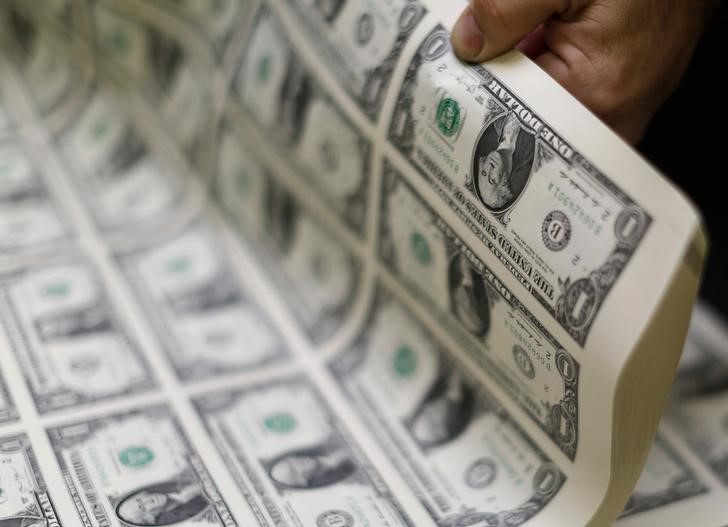Investing.com - The dollar tumbled over 1% against a basket of other major currencies on Tuesday, after data showing U.S. factory orders fell for the sixth straight month in April sparked concerns over strength of the economy.
The dollar weakened after the Commerce Department said factory orders fell 0.4% in April, confounding expectations for a 0.2% increase. March’s figure was revised to 2.2% from a previously reported 2.1%.
On a year-over-year basis, factory orders dropped 6.4%, the sixth straight monthly decline.
The unexpectedly weak data sparked fresh fears over the outlook for second quarter growth after data last month showed that the U.S. economy contracted 0.2% in the first quarter.
The dollar had gained ground on Monday as upbeat U.S. economic reports, including on manufacturing activity and construction spending, fuelled optimism that the economy was regaining momentum after a weak first quarter.
The U.S. dollar index, which measures the greenback’s strength against a trade-weighted basket of six major currencies, was down 1.42% at 96.14, the lowest level since May 22.
USD/JPY declined 0.55% to 124.11, pulling away from 12-year highs of 125.06 hit earlier.
The yen showed little reaction after Bank of Japan Governor Haruhiko Kuroda said Tuesday that it was important for currencies to reflect economic fundamentals.
EUR/USD rallied 1.94% to 1.1138, helped by data showing that euro zone consumer prices rose by 0.3% from a year earlier in May, following a flat reading in April. Economists had forecast an increase of 0.2%.
Underlying inflation, which excludes prices for energy, food and alcohol, also picked up. Annual core inflation rose 0.9% from a record low of 0.6% in April.
The euro’s gains were held in check however after Greek Prime Minister Alexis Tsipras said Tuesday that his government submitted a "comprehensive proposal" to its lenders late Monday and added that a decision on an agreement now rested on European political leaders.
Greece is due to make a €305 million payment to the International Monetary Fund on Friday but warned last month that it will be unable to make the repayment if a deal is not reached by then.
The pound was also higher, with GBP/USD advancing 0.82% to 1.5326, while USD/CHF tumbled 1.30% to 0.9337.
Sterling gained ground after market research firm Markit and the Chartered Institute of Purchasing & Supply said that their U.K. construction purchasing managers' index rose to 55.9 last month from a reading of 54.2 in April. Economists had expected the index to improve to 55.0 in May.
The Australian and New Zealand dollars were stronger, with AUD/USD up 1.89% to 0.7749 and with NZD/USD jumping 1.07% to trade at 0.7163.
Earlier Tuesday, the Reserve Bank of Australia left its benchmark interest rate at a record-low 2.00% in a widely expected move, but said monetary policy will remain "accomodative."
USD/CAD dropped 0.56% to 1.2452, pulling away from Monday's six-week highs of 1.2563.
